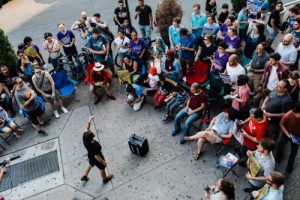


“This race is about people versus money,” said 28-year-old Democratic Socialist, Alexandria Ocasio-Cortez, who last Tuesday usurped the nomination from high-ranking House Democrat, John Crowley. Her viral campaign video also accused the reigning King of Queens of not breathing the same air or drinking the same water as his constituents. Very few expected Ocasio-Cortez’s grassroots movement to topple Crowley’s Wall Street funded political machine.
“People versus money” is the anthem of anti-establishment candidates. As the Left moves farther left, it is a song voters hear on repeat. Ocasio-Cortez’s nomination reveals just how catchy the tune first popularized by Senator Bernie Sanders is. “Medicare for all, tuition-free public college, and federal jobs guaranteed,” they chant. However, the Democratic Socialist’s paradigm is flawed. In advocating for socialized health care and education, they have neglected to account for monetary costs and the reality of human nature.
As the old economic adage goes, “There is no such thing as a free lunch.” For instance, a report produced by the nonpartisan Urban Institute analyzing “Sanders Single-Payer Health Care Plan” predicted that total federal spending would increase by $32 trillion in a ten-year span. This number represents the federal government’s absorption of state and local governments, employers, and households spending on health care. This tremendous increase in government spending would correspond to a tax, too hefty to be politically palatable.
Similarly, the championing of free public college is a mirage for another high tax which would ultimately diminish the value of education to what the public is willing to collectively invest. If the past is any predictor, the cost of college will continue to rise as more federal dollars are funnelled in. Coupled with increased demand, the cost of higher education would exponentially grow and strain public budgets.
The new Queen of Queens assumes that money left in the hands of private individuals leads to greed and marginalization, so it is safest in the hands of the bureaucrats in Washington. A romanticized administrative state purged of self-interest underlies this assumption. Economic thinkers from Frederic Bastiat to Albert Jay Nock have deemed taxes, especially at the magnitude proposed by Democratic Socialists, to be “legal plunder.” In The Law, Bastiat describes this phenomenon as: “law benefit[ing] one citizen at the expense of another by doing what the citizen himself cannot do mitting a crime.” The expanded state required for Democratic Socialist policies deliberately violates man’s private economic liberty by cultivating a “monopoly of crime.” Maybe the victorious self-proclaimed “working-class candidate” should reconsider the value of the working man’s economic liberty before demanding a greater share of his paycheck.
In her campaign video, Ocasio-Cortez asserts that she “was born in a place where zip code determines your destiny.” Yet, last Tuesday Ocasio-Cortez became one step closer to defying her own maxim. The same characteristics she exhibited in this feat–creativity, ingenuity, and hard work–are the same that individuals demonstrate when they choose work over welfare. In decrying the plunder of taxes, Bastiat praises man’s God-given faculties that when applied to the world’s natural resources promote mon good superior to that promised by government.
“People versus money” does not always have to mean Wall Street. The government has proven to be an unreliable steward of man’s money. Have you checked out the U.S. Debt Clock lately?
Photo Source: 05262018-Corey Torpie-Office Opening









